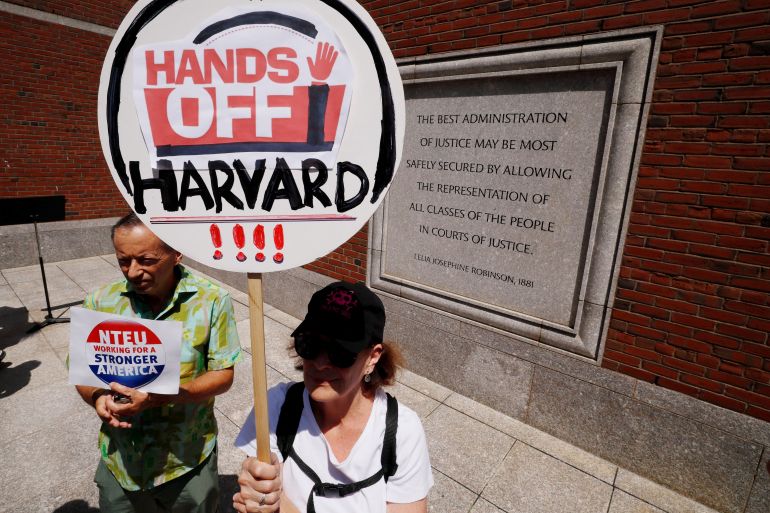US judge rules Trump unlawfully cut Harvard University research grants
The decision is a victory for the Ivy League university, which has been locked in a months-long feud with Trump.

Published On 3 Sep 20253 Sep 2025
A United States federal judge has ruled that the administration of President Donald Trump violated the law when it cancelled research grants worth more than $2.2bn to Harvard University.
The Wednesday decision from District Judge Allison Burroughs is a major setback for the Trump administration, which has sought to pressure universities into compliance with policies opposing pro-Palestine protests and diversity initiatives.
Recommended Stories
list of 3 itemsend of list
In her order, Burroughs explained that the funding cuts ran afoul of the First Amendment of the US Constitution, which protects free speech.
“The Court vacates and sets aside the Freeze Orders and Termination Letters as violative of the First Amendment,” the order states.
“All freezes and terminations of funding to Harvard made pursuant to the Freeze Orders and Termination Letters on or after April 14, 2025 are vacated and set aside.”
Burroughs also rejected the Trump administration’s claims that withholding Harvard’s grants was necessary to force the university to confront campus anti-Semitism. Rather, she pointed to ulterior motives.
“A review of the administrative record makes it difficult to conclude anything other than that Defendants used antisemitism as a smokescreen for a targeted, ideologically motivated assault on this country’s premier universities,” Burroughs wrote.
Trump’s threats against Harvard have been at the centre of his administration’s efforts to exert greater control over higher education. But critics denounced those moves as attacks on academic freedom and freedom of expression.
Other prestigious US universities have struck deals with the government amid threats to slash federal funding.
Advertisement
Columbia University, for instance, agreed to pay the administration $220m and comply with Trump administration demands, including changes to its disciplinary practices and the hiring of a new provost to ensure “balanced” curricula.
Brown University likewise cut a deal to restore its funding, including paying $50m to workforce training programmes in Rhode Island.
The University of Virginia, meanwhile, saw its president resign under threat of a Department of Justice investigation into its diversity programmes in June.
Trump has targeted several schools, including Columbia, for their prominent role in the antiwar protests that emerged after Israel launched its war on Gaza in October 2023.
The Trump administration argued that those protests promoted anti-Semitism and created an unsafe environment for Jewish students. Student activists, however, have rejected those assertions.
The activists also publicly questioned whether Trump’s actions were truly motivated by concerns about civil rights and anti-Semitism on campus.
Critics have argued that the Trump administration used anti-Semitism as a pretext for gaining greater control over academic activity. They also point out that instances of harassment and even violence against pro-Palestine students have received little attention.
In April, as Harvard faced dramatic cuts to its federal funding, the Trump administration issued a list of a demands for the school to comply with.
Those demands included changing its disciplinary practices, accepting an audit of its student admissions, and ending diversity, equity and inclusion (DEI) programmes.
Harvard, however, resisted, becoming the first top university to do so. University President Alan Garber explained that he saw the demands as an infringement on academic freedom.
Trump has since threatened to annul Harvard’s tax-exempt status and bar the school from admitting international students, among other things.
“The worthy goal of combating unlawful anti-Semitic discrimination on campus cannot justify the flatly unlawful and unconstitutional means used by the Trump administration in this attempted hostile takeover, including demanding that Harvard impose ideological litmus tests and restrictive speech codes,” the Foundation for Individual Rights and Expression (FIRE), a free speech organisation, said in a statement following Wednesday’s ruling.
